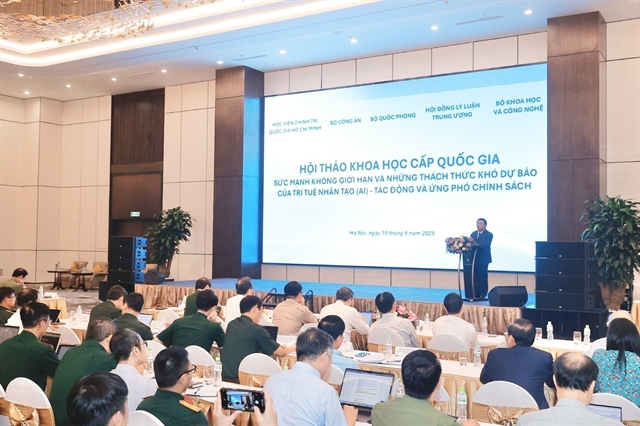 Society
Society


|
| Delegates at the national scientific conference on artificial intelligence in Hà Nội on Monday. — VNA/VNS Photo Minh Quyết |
HÀ NỘI — Việt Nam has strong potential for the development of artificial intelligence (AI), which is projected to contribute approximately US$79.3 billion to the country’s GDP, or 12 per cent, by 2030 if widely adopted, experts said.
The topic came under discussion at a national scientific conference on the unlimited power and unpredictable challenges of AI, as well as industry-related impacts and policy responses.
The event was held on Monday by the Hồ Chí Minh National Academy of Politics (HCMA) in collaboration with the Central Theoretical Council, the Ministry of Public Security, the Ministry of National Defence and the Ministry of Science and Technology.
Addressing the event, HCMA Director Nguyễn Xuân Thắng noted that the power of AI was evident in its application across multiple sectors.
"In finance, healthcare, media, education and manufacturing, AI now either replaces a portion of the workforce or assists in intellectual labour. The technology has become a driving force behind innovation, technical advancement, process optimisation and productivity enhancement, as well as sustainable added value," he said.
According to Oxford Insights’ Government AI Readiness Index, Việt Nam’s ranking has significantly improved in recent years.
In 2024, the nation ranked 51st out of 188 countries and territories globally, ninth in East Asia and fifth among ASEAN countries.
AI is becoming an indispensable part of shaping Việt Nam’s new growth models and socio-economic operation, management and governance, offering a golden opportunity for the nation to leap forward on its development path.
To realise this potential, Dr Thắng emphasised the need for strong coordination between national strategies and their actual implementation across businesses, institutions, schools and the broader community.
“Technology is a tool, but humans are the ultimate goal and decisive factor. Even with limitless possibilities, as some perceive, AI remains a man-made product,” he stressed.
Meanwhile, Minister of Public Security General Lương Tam Quang noted that the Party had identified science and technology, innovation and digital transformation as critical factors to help Việt Nam overcome the middle-income trap, avoid economic stagnation and achieve its two strategic centenary goals: to become an upper middle-income country by 2030 and a high-income nation by 2045.
Strategic technology development, including AI, is a priority and a key driver to rapidly build a modern workforce, improve national governance and foster socio-economic development, according to the minister.
To achieve the Party’s objectives, the public security minister stressed the importance of formulating long-term, comprehensive and synchronised strategies to identify a suitable path for Việt Nam. This should encompass legal frameworks, infrastructure, workforce training and development goals for AI.
Meanwhile, Minister of Science and Technology Nguyễn Mạnh Hùng highlighted that "AI represents a tremendous opportunity for Việt Nam to rise and stand shoulder-to-shoulder with global powers".
He noted that Việt Nam had transitioned from poverty to become a high middle-income country, and was currently the 32nd largest economy in the world.
With the right conditions and concentration of resources, Việt Nam could accelerate AI adoption, double its intellectual capacity, boost labour productivity, achieve double-digit economic growth, enhance national competitiveness, improve governance and better safeguard the nation, he said.
At the event, delegates also discussed theoretical issues related to AI in the digital era, the nature, characteristics and development trends of AI and its impacts and potential risks, as well as how the new context influences AI development.
They also proposed policies, governance mechanisms and strategic directions for Việt Nam to effectively develop AI. — VNS




